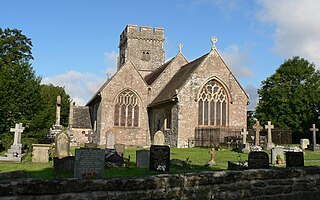
Gwened, Bro-Gwened or Vannetais is a historic realm and county of Brittany in France. It is considered part of Lower Brittany.

St Hilary is a village in the Vale of Glamorgan, Wales. It is located just south of the A48, about a mile southeast of the market town of Cowbridge. The village has a population of about 260, in approximately 80 houses. Notable landmarks in the vicinity include The Bush Inn, the Church of St Hilary, the Old Beaupre Castle, New Beaupre, Coed Hills and St. Hilary mast.

Llantrisant is a hamlet in Anglesey, Wales. It is in the community of Tref Alaw.
Caradoc or Caradog was a reclusive Welsh priest, widely respected for his sanctity. An inquiry into his qualifications for sainthood was commissioned in 1200 and, although such inquiry did not proceed, he has long been venerated as if papally canonised. Prior to canonisation of the Forty Martyrs in 1970, he was regarded as the last Welshman to become a saint.

The Old Church of St Afran, St Ieuan and St Sannan, Llantrisant, is a redundant church in the settlement of Llantrisant, Anglesey, Wales. It is designated by Cadw as a Grade II* listed building, and is under the care of the Friends of Friendless Churches. It is set in an isolated location off a country road and is adjacent to a farmstead.

The Parish Church of St Hilary is a Grade II* listed Anglican church in the village of St Hilary in the Vale of Glamorgan, south Wales. It is one of 11 churches in the Parish of Cowbridge. It became a listed building on 22 February 1963.

Saint Eigen, Eurgen, Eurgain or Eurgan was the legendary, and possibly historical first female Christian saint among the Britons. Her name has doubtfully been linked to two Welsh churches and is found in manuscripts from the collection of Iolo Morganwg making historical evidence of her existence dubious and limited.
Saint Gwrddlew or Gwrtheli, Gartheli, was a pre-congregational saint of 5th century medieval Wales.

Saint Eigrad or Eugrad was a sixth-century Welsh saint and the founder of St Eugrad's Church in Llaneugrad, Anglesey.

Saint Einion Frenin was a late 5th- and early 6th-century Welsh confessor and saint of the Celtic Church. His feast day was originally given as 9 February, although this had moved to the 10th or 12th by the 16th century and is no longer observed by either the Anglican or Catholic church in Wales.
Saint Gwrthwl is a Pre-Congregational Saint of Powys in Wales.

A Saint Ilar is listed among the 6th-century saints of Wales and is the probable namesake of Llanilar in Ceredigion and its former hundred of Ilar. His feast day is variously given as 13, 14, or 15 January, but is no longer observed by either the Anglican or Catholic church in Wales.
Saint Dyfnog was an early Welsh saint. His feast day is 13 February.

Ystrad Marchell was a medieval commote in the cantref of Ystlyg in the Kingdom of Powys. It roughly coincides with the parish of Welshpool.
Clydog was a sixth-century Welsh king of Ergyng who became a saint. His feast day is traditionally held on 3 November but is also celebrated on 19 August.

Tyfaelog was a 6th-century saint of Wales. The saint is connected to a small area near Brecon south Powys where there are two churches: Llandyfaelog Tre'r-graig and Llandyfaelog Fach. There is also a church in Llandyfaelog, between Kidwelly and Carmarthen (Carmarthenshire).
Saint Tydecho was a 6th century saint of Wales.
Tyfanog also known as Tauannauc is a Pre-Congregational Saint of Wales. He was a preacher of the Gospel who arrived in Briton in AD 186 and ended his days on Ramsey Island. He established a community during the Roman era on Ramsey Island. He is said to have been murdered by the natives of Ramsey Island and that his body swam across to where the chapel was built. A feast day celebrates his life November 25.
Clydwyn is a 6th-century Pre-Congregational Saint of Wales.











